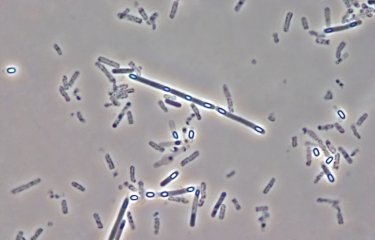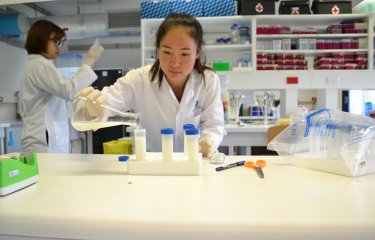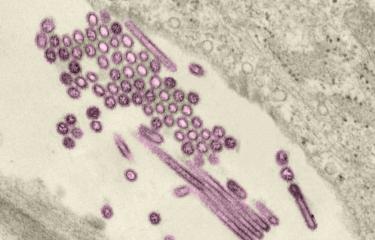The gut microbiota houses a complex and varied microbial community that coexists in a balance which is crucial for human health but poorly understood. In this microbiota bacteria are under the predation by their viruses, bacteriophages, but some of them may find refuge in the mucus that covers gut tissue, thereby preserving the balance between populations of bacteriophages and bacteria. These are the conclusions of a study led by Laurent Debarbieux, Director of Research and Head of the Bacteriophage, Bacterium, Host Laboratory at the Institut Pasteur, with Luisa De Sordi, a lecturer at Sorbonne University in the Saint-Antoine Research Center (Sorbonne University/Inserm), published on July 1, 2020 in Cell Host & Microbe.
Bacteria and bacteriophages (or phages) are the most abundant entities in the gut microbiota. Although phages kill bacteria, the two antagonist populations coexist in a balance in the gut. While previous research demonstrated that gut bacteria can develop resistance to phage predation through genetic modifications, such resistance was not observed in this latest study, performed on a mouse model carrying a synthetic microbiota in collaboration with the University of Munich [1].
Here, the authors observed that bacteria and phages are not distributed evenly in the digestive tract and that a large proportion of bacteria are found in the mucus that covers gut tissue. These new data support the theoretical ecological model known as the "source-sink dynamics", with mucus serving as a reservoir ("source") for bacteria, a habitat where they can multiply and remain hidden from their predators. The gut lumen represents a "sink" where bacteria are killed, allowing the phage population to grow.
"This research shows the importance of gut geography and its heterogeneous spatial structure in modulating the interactions that regulate the composition of the microbiota" explain Laurent Debarbieux and Luisa De Sordi, last authors of the study. The results have major implications for our understanding of gut balance, which is related to human health. Indeed, damages to the gut microorganisms are associated with several disorders and syndromes, such as diabetes, chronic inflammatory bowel disease and autism spectrum disorder. The findings may also guide the therapeutic use of phages (phage therapy) as a means of controlling the proliferation of intestinal pathogens.
[1] The study was carried out with the team led by (German Center for Infection Research).
Source
The spatial heterogeneity of the gut limits predation and fosters coexistence of bacteria and bacteriophages, Cell Host & Microbe, published online July 1st, 2020
Marta Lourenço, Lorenzo Chaffringeon, Quentin Lamy-Besnier, Thierry Pédron, Pascal Campagne, Claudia Eberl, Marion Bérard, Bärbel Stecher, Laurent Debarbieux and Luisa De Sordi,
DOI : 10.1016/j.chom.2020.06.002





